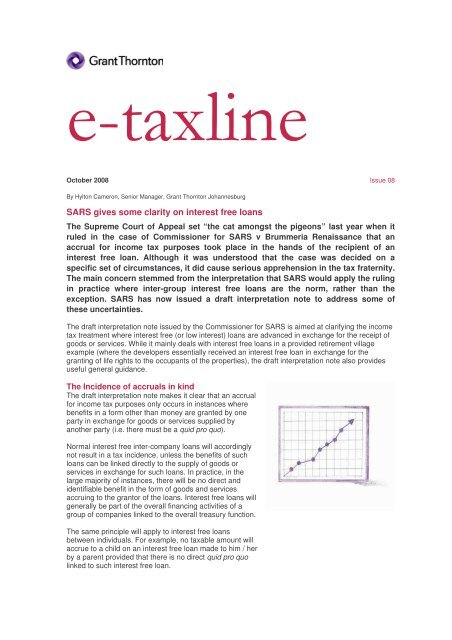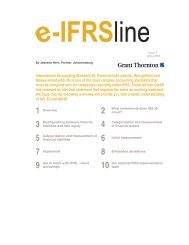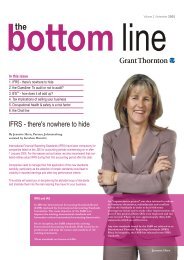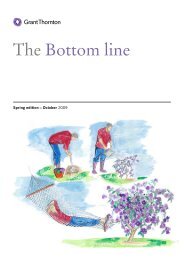SARS gives some clarity on interest free loans - Grant Thornton
SARS gives some clarity on interest free loans - Grant Thornton
SARS gives some clarity on interest free loans - Grant Thornton
Create successful ePaper yourself
Turn your PDF publications into a flip-book with our unique Google optimized e-Paper software.
October 2008 Issue 08<br />
By Hylt<strong>on</strong> Camer<strong>on</strong>, Senior Manager, <strong>Grant</strong> Thornt<strong>on</strong> Johannesburg<br />
<str<strong>on</strong>g>SARS</str<strong>on</strong>g> <str<strong>on</strong>g>gives</str<strong>on</strong>g> <str<strong>on</strong>g>some</str<strong>on</strong>g> <str<strong>on</strong>g>clarity</str<strong>on</strong>g> <strong>on</strong> <strong>interest</strong> <strong>free</strong> <strong>loans</strong><br />
The Supreme Court of Appeal set “the cat am<strong>on</strong>gst the pige<strong>on</strong>s” last year when it<br />
ruled in the case of Commissi<strong>on</strong>er for <str<strong>on</strong>g>SARS</str<strong>on</strong>g> v Brummeria Renaissance that an<br />
accrual for income tax purposes took place in the hands of the recipient of an<br />
<strong>interest</strong> <strong>free</strong> loan. Although it was understood that the case was decided <strong>on</strong> a<br />
specific set of circumstances, it did cause serious apprehensi<strong>on</strong> in the tax fraternity.<br />
The main c<strong>on</strong>cern stemmed from the interpretati<strong>on</strong> that <str<strong>on</strong>g>SARS</str<strong>on</strong>g> would apply the ruling<br />
in practice where inter-group <strong>interest</strong> <strong>free</strong> <strong>loans</strong> are the norm, rather than the<br />
excepti<strong>on</strong>. <str<strong>on</strong>g>SARS</str<strong>on</strong>g> has now issued a draft interpretati<strong>on</strong> note to address <str<strong>on</strong>g>some</str<strong>on</strong>g> of<br />
these uncertainties.<br />
The draft interpretati<strong>on</strong> note issued by the Commissi<strong>on</strong>er for <str<strong>on</strong>g>SARS</str<strong>on</strong>g> is aimed at clarifying the income<br />
tax treatment where <strong>interest</strong> <strong>free</strong> (or low <strong>interest</strong>) <strong>loans</strong> are advanced in exchange for the receipt of<br />
goods or services. While it mainly deals with <strong>interest</strong> <strong>free</strong> <strong>loans</strong> in a provided retirement village<br />
example (where the developers essentially received an <strong>interest</strong> <strong>free</strong> loan in exchange for the<br />
granting of life rights to the occupants of the properties), the draft interpretati<strong>on</strong> note also provides<br />
useful general guidance.<br />
The Incidence of accruals in kind<br />
The draft interpretati<strong>on</strong> note makes it clear that an accrual<br />
for income tax purposes <strong>on</strong>ly occurs in instances where<br />
benefits in a form other than m<strong>on</strong>ey are granted by <strong>on</strong>e<br />
party in exchange for goods or services supplied by<br />
another party (i.e. there must be a quid pro quo).<br />
Normal <strong>interest</strong> <strong>free</strong> inter-company <strong>loans</strong> will accordingly<br />
not result in a tax incidence, unless the benefits of such<br />
<strong>loans</strong> can be linked directly to the supply of goods or<br />
services in exchange for such <strong>loans</strong>. In practice, in the<br />
large majority of instances, there will be no direct and<br />
identifiable benefit in the form of goods and services<br />
accruing to the grantor of the <strong>loans</strong>. Interest <strong>free</strong> <strong>loans</strong> will<br />
generally be part of the overall financing activities of a<br />
group of companies linked to the overall treasury functi<strong>on</strong>.<br />
The same principle will apply to <strong>interest</strong> <strong>free</strong> <strong>loans</strong><br />
between individuals. For example, no taxable amount will<br />
accrue to a child <strong>on</strong> an <strong>interest</strong> <strong>free</strong> loan made to him / her<br />
by a parent provided that there is no direct quid pro quo<br />
linked to such <strong>interest</strong> <strong>free</strong> loan.
When does the accrual take place<br />
The principle applied in the draft interpretati<strong>on</strong> note is that the accrual takes place when the<br />
barter transacti<strong>on</strong> takes place (normally at the outset of a transacti<strong>on</strong>). This approach is in line<br />
with the normal principles of accrual, i.e. when a pers<strong>on</strong> becomes unc<strong>on</strong>diti<strong>on</strong>ally entitled to an<br />
amount.<br />
How must the accrual be valued<br />
Where the commercial benefit of the up-fr<strong>on</strong>t accrual is utilised over a period of time (for example,<br />
the utilisati<strong>on</strong> of an <strong>interest</strong> <strong>free</strong> loan over a period of time), the valuati<strong>on</strong> of such accrual<br />
represents a significant practical challenge.<br />
The draft interpretati<strong>on</strong> note provides an example dealing with the retirement village scenario,<br />
which sets out a barter transacti<strong>on</strong> that c<strong>on</strong>sists of two elements that need to be valued. In the<br />
first element, the developer receives an <strong>interest</strong> <strong>free</strong> loan for the remainder of the occupant’s life<br />
span, and in the sec<strong>on</strong>d, the developer’s right of use of the property is sterilised as l<strong>on</strong>g as the<br />
<strong>interest</strong> <strong>free</strong> loan is in place. The value of the accrual in the hands of the developer will<br />
accordingly be the net “profit”, or the difference between the value of the <strong>interest</strong> <strong>free</strong> loan and<br />
the right of use of the property.<br />
For the retirement village scenario, <str<strong>on</strong>g>SARS</str<strong>on</strong>g> uses the present value of the potential <strong>interest</strong> <strong>on</strong> the<br />
<strong>interest</strong> <strong>free</strong> loan, discounted at the average prime <strong>interest</strong> rate in that year. This amount is then<br />
reduced by the value of the usufruct in the underlying property (using the valuati<strong>on</strong> rules<br />
applicable to estate duty). In our opini<strong>on</strong>, this <str<strong>on</strong>g>gives</str<strong>on</strong>g> a fair valuati<strong>on</strong> of the up-fr<strong>on</strong>t accrual.<br />
In other cases where valuati<strong>on</strong> rules do not exist, it may be a significant challenge to identify and<br />
value the various elements of a barter transacti<strong>on</strong>. In this regard <str<strong>on</strong>g>SARS</str<strong>on</strong>g> has merely indicated that<br />
each case must be evaluated <strong>on</strong> its own facts and merits. This is likely to result in disputes with<br />
<str<strong>on</strong>g>SARS</str<strong>on</strong>g> in practice.<br />
Other issues<br />
The draft interpretati<strong>on</strong> note indicates that certain categories of transacti<strong>on</strong>s may give rise to a<br />
capital accrual in the hands of the various parties. We assume that this could potentially be in<br />
cases where the right provided is of a capital nature (although this is difficult to comprehend in<br />
practice). This is an issue where <str<strong>on</strong>g>SARS</str<strong>on</strong>g> needs to provide further <str<strong>on</strong>g>clarity</str<strong>on</strong>g>.<br />
General binding ruling<br />
Once final, the interpretati<strong>on</strong> note will c<strong>on</strong>stitute a general binding ruling which will be effective<br />
from the commencement of years of assessment ending <strong>on</strong> or after 31 December 2008.<br />
A new era<br />
The Brummeria case hailed a new era in income tax. It is now necessary to carefully identify and<br />
value the various elements of barter transacti<strong>on</strong>s. Failing this, taxpayers will be left at the mercy<br />
of <str<strong>on</strong>g>SARS</str<strong>on</strong>g> to value the amount of the accrual. The <strong>on</strong>us of disproving <str<strong>on</strong>g>SARS</str<strong>on</strong>g>’ valuati<strong>on</strong> will rest with<br />
the taxpayer.
For further informati<strong>on</strong> c<strong>on</strong>tact:<br />
Cape Town<br />
Mike Teuchert<br />
Tax Partner<br />
T +27 (0)21 481-9000<br />
Durban<br />
T<strong>on</strong>y Berman<br />
Tax Partner<br />
T +27 (0)31 576-5500<br />
Eastern Cape<br />
Kathy Dix<strong>on</strong><br />
Tax Manager<br />
T +27 (0)43 726-9898<br />
Johannesburg<br />
Christo Ther<strong>on</strong><br />
Tax Director<br />
T +27 (0)11 322-4838<br />
Pretoria / Tshwane<br />
Lawrence Hummel<br />
Partner<br />
T +27 (0)12 346-1430<br />
Media enquiries<br />
Olivia Beckett<br />
Senior Marketing/Communicati<strong>on</strong>s Executive<br />
T +27 (0)11 322-4701<br />
You may subscribe or unsubscribe from this communicati<strong>on</strong> at any time by sending us an email.










